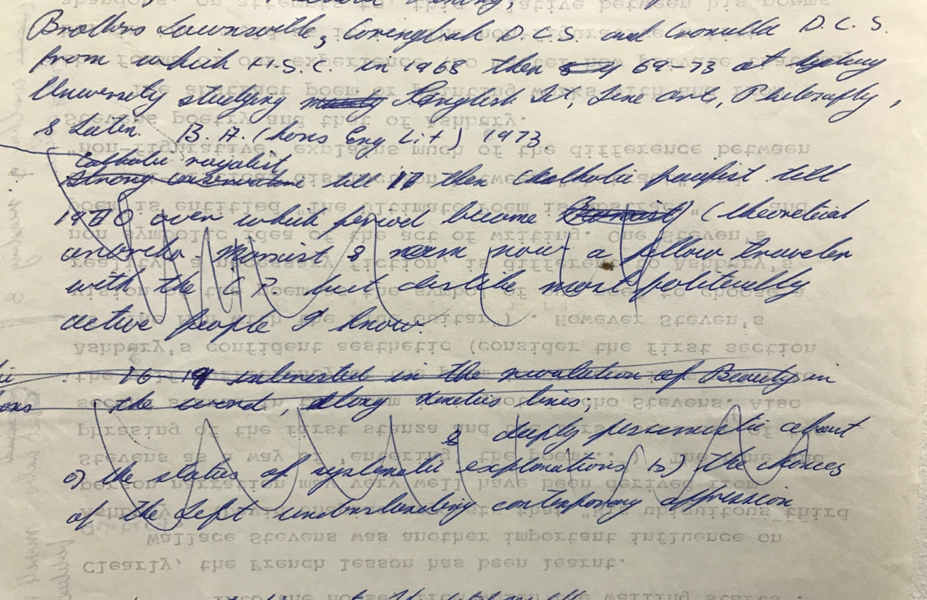AustLit
-
Biographical Details:
Between selling souvenirs, moving furniture and itinerant teaching, Forbes would occasionally sit down and write a curriculum vitae as a ritual sacrifice to the notion (or the wish) of 'get the money.' Here is a specimen sample:
Political beliefs:
Strongly ConservativeCatholic Royalist till 17 then catholic pacifist till 1970 over which period became theoretical Anarcho-Marxist & now a fellow traveller with the CP. but dislike most politically active people I know.Aesthetic Convictions: 16-19 Interested in the revolution of Beauty in the word, along (illegible) lines;
& deeply pessimistic about a) the status of systematic explanations b) the choices of The left understanding contemporary oppression.’
Politics: Aristotle and communism
Pet hates: myself, trendy bullshit, both social, aesthetic and political
(UQFL 148/F/2/7)
Forbes keeps writing a curriculum vitae as the vida (life) of a vocational poet. He cannot do otherwise. The perspective is 'unco': regarding the self as a familial yet suddenly strange thing with a traceable contextual history, a nebulous localisation within the ideological, aesthetic and affective co-ordinates of the major codex that calls itself 'The West.' This draft constitution of an employable self is scrawled on the back of an essay on John Ashbery.
The jest is scratched out indicating a return to seriousness, yet as a gambit it is revealing. His playful instinct is to resist the demands of a sterile genre and its attendant boredom, and declare his 'interest…in the revolution (revelation?) of Beauty in the word.' This is a belief in the practice of poetry as the paragon of human activity, despite any persuasion of politics, as he describes his swerves between 'Catholic Royalist' and theoretical' Anarcho-Marxist. The jolt of these extremes must alert us to the mechanisms of comedy, and does the manner of his self-loathing and misanthropy combined with a feu d’esprit.
Note the signature mix of bravura and collapse, of triumphant coming into being and auto-annihilation: 'Profession: my profession is my religion,/ My sin is my lifelessness.' The confirmation of vocation is a revolution/ revelation, but this is immediately undercut by what Alan Wearne has called Forbes’s 'guilt-doomed' attraction to personal melodrama and a rich sense of sin. His declared 'Ethical beliefs' are a model of antagonism, an 'Aristotealian communist' whose advice is 'to take the money and run.' The equation is perfectly explosive: Aristotle, the astute logician of eudaemonia (happiness) is multiplied by an historical responsibility for social justice (communism), but the common denominator is avariciousness and flight.
We note from his résumé Forbes was educated by the Christian Brothers in Sydney, and his Jesuit heritage causes him to develop a revolutionary or resistant conception of the self: to take the things of the world seriously but not to take the self seriously, and there is a concurrent desire to revolutionise symbolic exchange between people- to be continually inventive in art, thinking and conversation.
Forbes’s Jesuitical rigour is reserved for a guileless or 'humanist' use of language that would be substantially guaranteed by an ordained soul behind it. Forbes reads this humanist positioning as being allied to the enlightened (sensitive) bourgeois subject whose jealous propriety of self extends to its expression in art. Forbes seems to take poststructuralist insights about the contingency, relativity and infidelity of language and identity to be a reason for its re-instatement as a protean social technic for the making of a just republic. Language, because of its mutability and duplicity, brings with it a pagan qualification: it translates the carnality of words and their inscrutable 'thingness' into a virtue.
You might be interested in...





